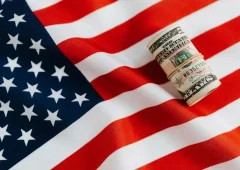Amazon Stock Rises Despite Tariff Controversy Ahead of Q1 Earnings
30.04.2025 16:57 1 min. read Alexander Stefanov
Amazon briefly sparked political controversy after exploring the idea of showing shoppers how tariffs are impacting product prices—a move that quickly drew fire from President Trump’s team.
According to a report from Punchbowl News, the company considered adding a feature to its Amazon Haul platform that would make import-related cost increases visible to consumers.
Trump’s camp slammed the idea, calling it a politically motivated jab and questioning why Amazon hadn’t flagged inflation spikes under the Biden administration in the same way.
Despite the noise, Amazon stock rose 1.3% on the day, closing at $187.46 on April 30. A spokesperson later clarified that the proposed feature wasn’t intended for Amazon’s main shopping site and that tensions eased after a phone call between Trump and founder Jeff Bezos.
Even with the issue apparently settled for now, Amazon could still feel the impact of shifting trade policies in the months ahead. Tariffs remain a risk for retailers with complex supply chains, and analysts will be watching closely during the company’s upcoming earnings report on May 1.
Although price targets for Amazon shares have been revised slightly lower in recent weeks, market sentiment remains positive overall. After a mixed Q4 performance—where strong results were undercut by cautious guidance—investors are looking for signs of stability as Q1 results approach.
-
1
Nvidia Surges as Barclays Sees $200 Target on Blackwell Momentum
18.06.2025 11:00 1 min. read -
2
Gold Glides Toward New Peaks as Middle-East Strife Lifts Safe-Haven Demand
15.06.2025 10:00 2 min. read -
3
a16z Backs EigenCloud Launch With Fresh $70M Token Buy
18.06.2025 14:00 1 min. read -
4
Bybit Steps Into DeFi With Solana-Based Platform
16.06.2025 17:00 1 min. read -
5
ARK Invest Takes Early Profits After Circle’s Skyrocketing IPO
18.06.2025 9:00 1 min. read
What’s Driving July’s Crypto Conversations, According to Santiment
According to Santiment’s latest narrative dashboard, the start of July has seen a surge in online discussions around a wide range of crypto themes, with Solana ETFs, stablecoins, Virtuals, Robinhood, and AI bot projects like Yapyo & Kaito leading the spike in mentions across platforms.
Market Odds of a U.S. Recession in 2025 Drop in Half Since May
The likelihood of the United States entering a recession in 2025 has dropped significantly, according to the latest market data from prediction platform Polymarket, where recession odds have fallen to just 22%, marking a notable decline from earlier highs in April and May.
Majority of U.S. Crypto Investors Back Trump’s Crypto Policy, Survey Finds
A recent poll reveals that over 70% of U.S. crypto investors support President Donald Trump’s current approach to digital asset policy, reflecting growing optimism within the sector.
Donald Trump Signs “One Big Beautiful Bill”: How It Can Reshape the Crypto Market
U.S. President Donald Trump has officially signed his sweeping policy bill into law, enacting one of the most consequential pieces of legislation of his presidency.
-
1
Nvidia Surges as Barclays Sees $200 Target on Blackwell Momentum
18.06.2025 11:00 1 min. read -
2
Gold Glides Toward New Peaks as Middle-East Strife Lifts Safe-Haven Demand
15.06.2025 10:00 2 min. read -
3
a16z Backs EigenCloud Launch With Fresh $70M Token Buy
18.06.2025 14:00 1 min. read -
4
Bybit Steps Into DeFi With Solana-Based Platform
16.06.2025 17:00 1 min. read -
5
ARK Invest Takes Early Profits After Circle’s Skyrocketing IPO
18.06.2025 9:00 1 min. read


